Circular debt will rise without loadshedding in high-theft areas: Hammad Azhar
There are certain feeders where 70-80% of the power supply is stolen, says energy minister
June 13, 2021

Minister for Energy Hammad Azhar on Sunday said that without loadshedding in high-theft areas, the country's circular debt will continue to rise.
Speaking to Geo News on programme "Naya Pakistan", the energy minister said that since 2011, due to non-payments, loadshedding had to be carried out. He said that there are certain feeders where 70-80% of the power supply is stolen.
Speaking of other factors at play, the minister said that during three weeks or about a month each year that the demand for electricity is at its peak. He said that over the course of the rest of the year, the demand for electricity is otherwise not as high.
The minister said that the government had made capacity payments worth Rs400bn this year, up from last year. He added that even when the load is 6,000-8,000MW, these payments have to be made.
Furthermore, Azhar said that the country's transmission lines require attention, which was never given by the past governments, and which is a major contributing factor to loadshedding.
Talking about his predecessor, he said that in Omar Ayub's time, capacity for transmission lines had been ramped up to 4,000MW.
He said that in the next six months, his ministry would add 3,000MW to the distribution system.
The minister lamented that in 2015, the PML-N had signed an MOU for a gas pipeline project, but no work was done on it.
Speaking of major power breakdowns, said that when large hydel plants plants experience a breakdown, it takes two days to catch up using other plants.
On other matters, including the privatisation of state institutions, Azhar said that this year there is also a possibility of bids for the Pakistan Steel Mills.
The minister said that he speaks to the finance minister and the privatisation minister every two weeks.
He said the privatisation of DISCOs would yield benefits that no other approach would, adding that small DISCOs need to be privatised.
He said that large DISCOs, while having performed well, were also in need of reforms the most.
Azhar said that currently, petrol and diesel are set at the lowest possible rates.
The minister said that within the last six to seven months, demand for petroleum products had risen and forecast that next year, the refineries would produce even more oil.











